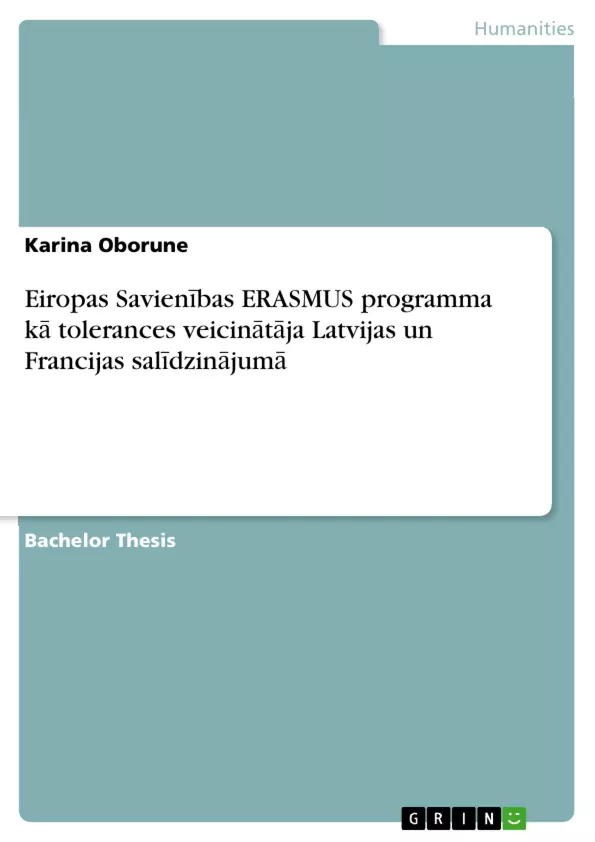Bachelor thesis “The ERASMUS Programme of European Union as the Promoter of Tolerance Comparing Latvia to France” draws attention to one of the most successful examples of European integration and symbols of construction of European identity – ERASMUS programme. There was brought forward issue is the ERASMUS Programme of European Union promoter of tolerance.
For giving the response to given issue, the main aim of bachelor thesis was to do research on ERASMUS programme comparing the experience of students of Latvia to France. The author put forward following hypothesis – the ERASMUS programme of European Union promotes tolerance on the basis of encouraging multicultural experience, intercultural education, diminishing social distance, breaking stereotypes, furthering confidence and overtness.
Through analysis of cognitions of D. Heyd, S. Lowy, I. Apine, L. Ose and other researchers author has drafted definition of tolerance – tolerance is desire, ability and action, it is honouring through co-operating and not showing prejudices against the member of the other culture. One of the most significant tasks of the thesis was analysis of ERASMUS programme in the context of history and European integration theories – neofunctionalism and liberal intergovernmental approach. Author of the thesis concludes that the commencement period of the formation of ERASMUS programme can be explained by both integration theories.
Through analysis of questionnaires (quantitative method) of respondents of University of Latvia (UL) and Institut d’ Etudes Politiques (IEP) in the empirical part of bachelor thesis author came to conclusion that ERASMUS programme (on the basis of multicultural experience and intercultural education) has promoted overtness and confidence in students, diminishing social distance and encouraging the breaking of stereotypes during exchange that, in its turn, is indicative of tolerance promotion. Comparing the handed responses of respondents of UL and IEP, author has deduced that the role of promoting tolerance was less inherent to students of IEP than UL, in its turn, the formation of stereotypes was more inherent to students of UL.
Through analysis of partly structured and structured interviews (qualitative method), both experts of ERASMUS programme and tolerance indicated that one of the aims of ERASMUS programme is promoting tolerance and intercultural education.
Inhaltsverzeichnis
- IEVADS
- I TEORĒTISKĀ DAĻA.
- 1.1. Tolerances koncepts, tolerances kritēriji un rādītāji.
- 1. 2. Multikulturālisma koncepts
- 1. 3. Starpkultūru izglītības koncepts
- 1. 4. Sociālās distances koncepts
- 1. 5. Stereotipu un aizspriedumu koncepti.
- II EMPĪRISKĀ DAĻA.
- 2.1. Eiropas Savienības ERASMUS apmaiņas programmas analīze.
- 2.1.1. ERASMUS apmaiņas programmas analīze Eiropas Kopienas integrācijas kontekstā no 1969. līdz 1987. gadam.
- 2.1.2. ERASMUS apmaiņas programmas analīze Eiropas Savienības integrācijas kontekstā pēc 1987. gada
- 2.1.3. ERASMUS apmaiņas programmas analīze Eiropas Savienības (ES) integrācijas teoriju kontekstā.
- 2.2. Pētījuma metodoloģija
- 2.2.1. Aptaujas empīriskā pamata izvēles pamatojums
- 2.2.2. Daļēji strukturēto un strukturēto interviju izvēles pamatojums
- 2.3. Aptauju analīze
- 2.3.1. Pētījuma mērķa grupu sociāli demogrāfiskais profils
- 2.3.2. Aptaujas datu analīze
- 2.3.3. Aptaujas kopsavilkums
- 2.4. Interviju analīze
- 2.4.1. Strukturēto interviju analīze ar ERASMUS programmas ekspertiem
- 2.4.2. Daļēji strukturēto interviju analīze ar tolerances ekspertiem.
- 2.4.3. Interviju kopsavilkums
- SECINĀJUMI.
Zielsetzung und Themenschwerpunkte
Der vorliegende Bachelor-Arbeit untersucht die Rolle des Europäischen Union (EU) ERASMUS Programms in der Förderung von Toleranz. Ziel des Papiers ist es, zu überprüfen, ob das ERASMUS Programm tatsächlich zu einem Anstieg der Toleranz bei Studenten führt, die an diesem Programm teilnehmen. Die Analyse konzentriert sich auf den Vergleich der Erfahrungen von Studenten in Lettland und Frankreich.
- Der konzeptionelle Rahmen der Toleranz und ihre Indikatoren
- Die Bedeutung des Multikulturalismus und interkulturellen Lernens
- Das ERASMUS Programm als Beispiel für interkulturellen Austausch
- Die Analyse von Studenten-Erfahrungen mit dem ERASMUS Programm
- Die Rolle des Programms in der Förderung von Toleranz und interkulturellem Verständnis
Zusammenfassung der Kapitel
Die Arbeit beginnt mit einer umfassenden Diskussion des Toleranzkonzepts, seiner Messgrößen und seiner Bedeutung in modernen Gesellschaften. Es werden verschiedene Theorien zum Multikulturalismus und zur Interkulturellen Bildung diskutiert.
Im zweiten Teil der Arbeit wird das ERASMUS Programm analysiert und seine Entwicklung im Kontext der europäischen Integration untersucht. Es werden verschiedene Ansätze und Methoden zur Analyse der Programmwirkung vorgestellt.
Die dritte Sektion konzentriert sich auf die Darstellung der Forschungsmethodik und umfasst die Ergebnisse der durchgeführten Umfragen und Interviews. Es werden die Profile der befragten Studenten, die Ergebnisse der Datenanalyse sowie die Ergebnisse der Interviews mit ERASMUS Experten und Toleranzexperten vorgestellt.
Schlüsselwörter
Die Arbeit fokussiert auf die Themenbereiche Toleranz, Multikulturalismus, Interkulturelle Bildung, ERASMUS Programm, Studentenmobilität, interkulturelles Verständnis, europäische Integration, Forschungsmethodik, qualitative und quantitative Datenanalyse, Vergleichsstudien, Lettland und Frankreich.
Häufig gestellte Fragen
Fördert das ERASMUS-Programm tatsächlich die Toleranz?
Die Arbeit bestätigt die Hypothese, dass das Programm durch multikulturelle Erfahrungen und interkulturelle Bildung die Offenheit fördert und soziale Distanz verringert.
Welche Unterschiede gab es zwischen lettischen und französischen Studenten?
Die Studie ergab, dass die toleranzfördernde Wirkung bei lettischen Studenten (UL) oft stärker ausgeprägt war, während französische Studenten (IEP) teilweise weniger Veränderung in ihren Vorurteilen zeigten.
Was ist die Rolle von Stereotypen im Studentenaustausch?
ERASMUS hilft dabei, bestehende Stereotype abzubauen. Allerdings wurde beobachtet, dass lettische Studenten anfangs stärker zu stereotypem Denken neigten, dieses aber im Verlauf des Programms oft revidierten.
Wie wird Toleranz in dieser Bachelorarbeit definiert?
Toleranz wird als die Fähigkeit und Bereitschaft definiert, Mitglieder anderer Kulturen zu respektieren, mit ihnen zu kooperieren und Vorurteile aktiv abzubauen.
Welche Integrationstheorien erklären den Erfolg von ERASMUS?
Die Arbeit nutzt den Neofunktionalismus und den liberalen Intergouvernementalismus, um die Entstehung und den Erfolg des Programms im Kontext der europäischen Einigung zu analysieren.
- Citar trabajo
- Karina Oborune (Autor), 2008, Eiropas Savienības ERASMUS programma kā tolerances veicinātāja Latvijas un Francijas salīdzinājumā, Múnich, GRIN Verlag, https://www.grin.com/document/162866



